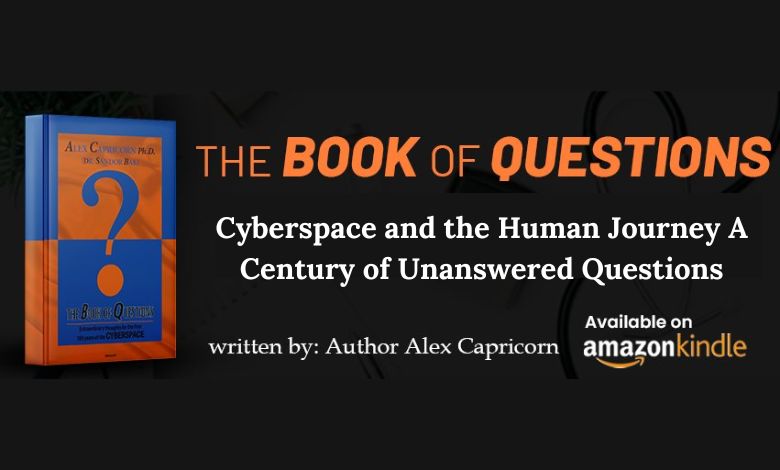Introduction
In the past century, cyberspace has evolved from a novel concept to an integral part of daily life, shaping nearly every aspect of human existence. Today, Alex Capricorn presents a fascinating exploration of this ever-expanding virtual world in The Book of Questions: Extraordinary thoughts for the first 100 years of CYBERSPACE. The book delves into the philosophical, ethical, and societal dimensions of cyberspace, encouraging readers to question their understanding of this digital realm. Instead of providing concrete answers, Capricorn frames his insights through thought-provoking questions, pushing readers to reflect deeply on the nature of technology, humanity, and the future of both. In this PR article, we will explore the central themes of the book and discuss its relevance in today’s increasingly interconnected world.
Cyberspace as a Reflective Mirror of Humanity
One of the fundamental ideas Capricorn explores is the concept of cyberspace as a reflection of humanity itself. Rather than viewing cyberspace solely as a tool for communication and information exchange, he argues that it serves as a mirror, amplifying human desires, fears, and aspirations. In The Book of Questions, Capricorn presents a series of questions that encourage readers to ponder how the digital world shapes their identity, behavior, and relationships. Is cyberspace a neutral zone, or does it inherently reflect both the best and worst qualities of human nature?
This line of questioning touches on profound ethical issues, such as the consequences of online anonymity and the rise of digital addiction. As people spend more time immersed in virtual spaces, the boundaries between their online and offline selves blur, raising important questions about authenticity and self-expression. Capricorn encourages readers to reflect on their own experiences with technology, asking whether cyberspace is truly serving humanity’s needs or simply amplifying its inherent contradictions.
In this context, cyberspace becomes not just a technological innovation, but a platform for understanding ourselves and our collective behaviors. Capricorn’s questions invite readers to consider whether the digital spaces we create are a reflection of the world we wish to live in or if they reveal deeper truths about human nature that we are reluctant to confront.
The Role of Cyberspace in Social Evolution
Another central theme in The Book of Questions is the role of cyberspace in shaping social evolution. Capricorn raises the provocative question: Has cyberspace truly helped society evolve, or has it created more divisions? In an age where social media platforms dominate communication, the impact of these virtual environments on relationships, communities, and societal norms cannot be ignored.
Capricorn examines how cyberspace has changed the way we interact with one another, challenging the idea that the internet has inherently brought people closer together. On the surface, it may seem that digital platforms allow for unprecedented levels of connection, but Capricorn’s questions dig deeper. Are we really more connected, or has cyberspace created a fragmented, superficial form of interaction that lacks genuine human connection? Have the digital platforms that were meant to foster open communication instead contributed to polarization and misinformation?
In addition to the effects on relationships, Capricorn delves into the democratization of information. The internet has revolutionized access to knowledge, making vast amounts of information available at our fingertips. However, Capricorn asks whether this access has truly made us more informed, or if it has overwhelmed us with an excess of conflicting data. The proliferation of online sources, some reliable and others dubious, forces readers to consider how they navigate the vast ocean of digital information. Have we become smarter, or simply more confused in a sea of endless content?
These questions are essential in understanding how cyberspace has transformed not only individual behaviors but also collective social dynamics. As digital spaces continue to evolve, Capricorn urges readers to reflect on whether these spaces are helping or hindering our progress as a society.
Ethics in Cyberspace: The Question of Control
A recurring theme throughout The Book of Questions is the question of control in cyberspace. Who holds the power in this virtual realm? Is it governments, corporations, or the individuals who navigate the digital world? Capricorn’s exploration of control touches on crucial ethical issues, particularly in the context of data privacy, surveillance, and the increasing influence of artificial intelligence (AI).
In today’s digital age, personal data has become a valuable commodity, with companies and governments alike collecting vast amounts of information about individuals. Capricorn asks whether privacy in the digital world is becoming an illusion. How much control do individuals truly have over their personal information, and what are the implications of this loss of control for society as a whole? As more aspects of our lives move online, the erosion of privacy becomes a pressing concern that requires careful consideration.
Moreover, Capricorn raises questions about the role of AI and algorithm-driven platforms in shaping online experiences. As algorithms increasingly dictate what content individuals see, how much autonomy do people have in their digital interactions? Are we becoming passive consumers of information, guided by unseen forces, or do we still have the ability to exercise agency in cyberspace? These questions challenge readers to think critically about the ethical implications of living in a world where data, algorithms, and AI are powerful forces shaping human experience.
The Future of Cyberspace
Looking ahead, Capricorn doesn’t limit his inquiries to the present. In The Book of Questions, he explores the future of cyberspace and the potential consequences of continued technological advancement. Will artificial intelligence surpass human intelligence? Will we one day merge biological consciousness with digital consciousness? These speculative questions tap into both utopian and dystopian visions of the future, prompting readers to consider the long-term implications of cyberspace on humanity.
One of the most intriguing questions Capricorn raises is whether humanity will maintain control over the technologies we have created, or if we will eventually become subjects of our own inventions. As AI and machine learning continue to advance, the line between human and machine intelligence becomes increasingly blurred. Capricorn’s inquiries encourage readers to reflect on the ethical and philosophical questions surrounding the future of AI and the potential for machines to outpace human decision-making.
At the same time, Capricorn explores the possibility of digital immortality. Could our minds one day live forever in cyberspace, free from the constraints of the physical world? While this idea may seem far-fetched, Capricorn challenges readers to think about the implications of such a reality. Would digital immortality be a gift or a curse? And what would it mean for our understanding of life, death, and existence?
Conclusion
The Book of Questions is not merely a philosophical text; it is a call to action for all who engage with cyberspace. By framing his insights through thought-provoking questions, Alex Capricorn, Ph.D., challenges readers to think critically about the evolving relationship between humanity and technology. In a world where the digital and physical realms are increasingly intertwined, his inquiries encourage intellectual engagement and self-reflection. This book is essential reading for anyone interested in the future of technology and its impact on human society. Whether you’re a tech enthusiast, a philosopher, or simply curious about the direction in which cyberspace is heading, The Book of Questions offers a compelling exploration of the digital world and the questions that will shape its future.


